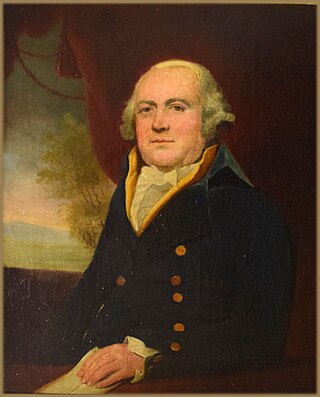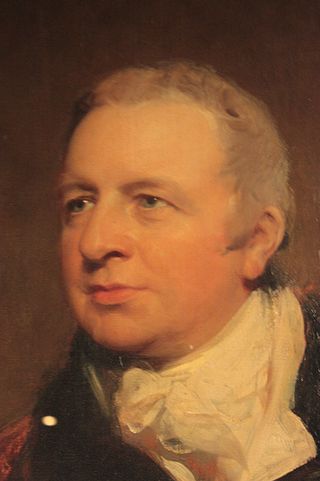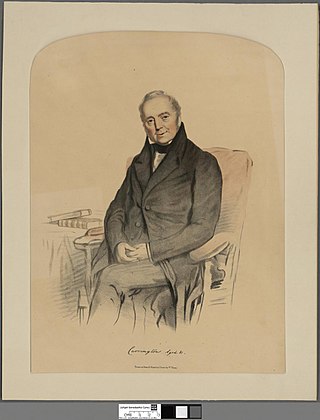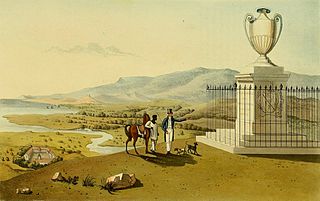Related Research Articles

Josiah Spode was an English potter and the founder of the English Spode pottery works which became famous for the high quality of its wares. He is often credited with the establishment of blue underglaze transfer printing in Staffordshire in 1781–84, and with the definition and introduction in c. 1789–91 of the improved formula for bone china which thereafter remained the standard for all English wares of this kind.
Robert Hibbert was the founder of the Hibbert Trust.

Robert Milligan was a Scottish merchant, ship-owner and slave trader who was the driving force behind the construction and initial statutory sectoral monopoly of the West India Docks in London. From 1768 to 1779 Milligan was a merchant in Kingston, Jamaica. He left Jamaica in 1779 to establish himself in London, where he got married and had a family of eight children. He moved to Hampstead shortly before he died in 1809. By the time of his death, one of Milligan's partnerships had interests in estates in Jamaica which owned 526 slaves in their sugar plantations.

George Hibbert was an English merchant, politician and ship-owner. Alongside fellow slaver Robert Milligan, he was also one of the principals of the West India Dock Company which instigated the construction of the West India Docks on London's Isle of Dogs in 1800. An amateur botanist and book-collector, he also helped found the Royal National Lifeboat Institution in 1824.

The Boston News-Letter, first published on April 24, 1704, is regarded as the first continuously published newspaper in the colony of Massachusetts. It was heavily subsidized by the British government, with a limited circulation. All copies were approved by the Royal governor before publication. The colonies’ first newspaper was Publick Occurrences Both Forreign and Domestick, which published its first and only issue on September 25, 1690. The Weekly Jamaica Courant followed in Kingston, Jamaica from 1718. In 1726 the Boston Gazette began publishing with Bartholomew Green, Jr., as printer.

The Randolph family of Virginia is a prominent political family, whose members contributed to the politics of Colonial Virginia and Virginia after statehood. They are descended from the Randolphs of Morton Morrell, Warwickshire, England. The first Randolph in America was Edward Fitz Randolph, who settled in Massachusetts in 1630. His nephew, William Randolph, later came to Virginia as an orphan in 1669. He made his home at Turkey Island along the James River. Because of their numerous progeny, William Randolph and his wife, Mary Isham Randolph, have been referred to as "the Adam and Eve of Virginia". The Randolph family was the wealthiest and most powerful family in 18th-century Virginia.
Hibbert is a surname. Its origin can be traced back to the Old Germanic given name Hildeberht, which is composed of German elements hilde and berht. Today it might be translated to "bright battle". It was adopted by the Normans, where it became "Hildebert" or "Hilbert".

Robert Smith, 1st Baron Carrington, was a British banker, slave owner and politician who sat in the House of Commons from 1779 to 1797 when he was raised to the peerage.

Thomas Hibbert (1710–1780) was an English merchant and planter who became a prominent figure in colonial Jamaica.
Robert Hibbert was a British merchant in Manchester with commercial premises on King's Street.
Joseph Foster Barham, the younger was an English politician, merchant and plantation owner.

The Leeward Islands Station originally known as the Commander-in-Chief at Barbadoes and the Leeward Islands was a formation or command of the Kingdom of Great Britain and then the United Kingdom's Royal Navy stationed at English Harbour, Antigua, Leeward Islands. It existed from 1743 to 1821.
William Pulsford (1772–1833), the elder, was a London merchant and a plantation owner in Jamaica. He became a landowner in several English counties.
William Hibbert was an English planter, slave trader and merchant. He was the sixth son of Robert Hibbert (1717–1784) and Abigail Scholey. With his brother George Hibbert and cousin Robert Hibbert (1769–1849), William was a partner in the West Indian merchant house Geo. Rob. & Wm. Hibbert. The firm was involved in the slave trade and principally with the shipping, insurance and distribution of sugar from the West Indies.
William Atherton, was a merchant and wealthy landowner from Lancashire, England, who operated and co-owned sugar plantations in the former Colony of Jamaica. He was a slave owner, as well as an importer of slaves from Africa.
Walton Hall was a 17th-century historic country house, set in a 300-acre (1.2 km2) estate, which was demolished in the early 20th century. Sometimes referred to as Walton Old Hall, it was situated at the centre of the Walton Hall Park in Walton, Liverpool. Its former residents were Liverpool merchants and the last two families to reside at Walton Hall profited from the Atlantic slave trade. In the 19th century it was the home of Thomas Leyland during his second and third term as Lord Mayor of Liverpool.
References
- 1 2 Hall et al, p.210.
- 1 2 Hall et al, p.207.
- ↑ "Hibberts in Jamaica". GeorgeHibbert.com. Retrieved 28 July 2015.
- ↑ "HIBBERT, George (1757–1837), of Clapham, Surr". History of Parliament Online. Retrieved 28 July 2015.
- ↑ An alphabetical List of the Names and Places of Abode of the Directors of Companies, Persons in Public Business, Merchts., and other eminent Traders in the Cities of London and Westminster, and Borough of Southwark. Kent's Directory for the Year 1794. Cities of London and Westminster, & Borough of Southwark
- ↑ Edward Purrier: Profile & Legacies Summary. Legacies of British Slave Ownership. UCL. Accessed: 31 July 2015.
- ↑ "Joining the Royal Navy". Nelson, Trafalgar and those who served. National Archives. Retrieved 28 July 2015.
Sources
- Hall, Catherine; McLelland, Keith; Draper, Nick; Donington, Kate; Lang, Rachel (2014). Legacies of British Slave-Ownership: Colonial Slavery and the Formation of Victorian Britain. Cambridge University Press. ISBN 978-1107040052.